初中英语句型转换
七年级英语句型转换专项练习及答案
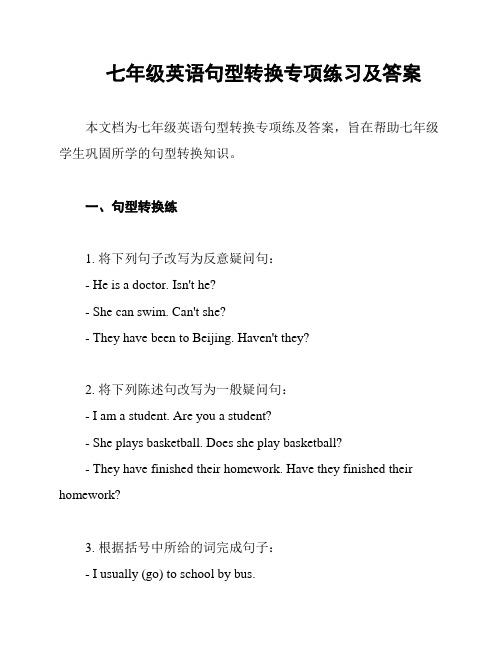
七年级英语句型转换专项练习及答案本文档为七年级英语句型转换专项练及答案,旨在帮助七年级学生巩固所学的句型转换知识。
一、句型转换练1. 将下列句子改写为反意疑问句:- He is a doctor. Isn't he?- She can swim. Can't she?- They have been to Beijing. Haven't they?2. 将下列陈述句改写为一般疑问句:- I am a student. Are you a student?- She plays basketball. Does she play basketball?- They have finished their homework. Have they finished their homework?3. 根据括号中所给的词完成句子:- I usually (go) to school by bus.- He (not like) hamburgers.- We (have) a test next Monday.- They (watch) a movie last night.二、答案1. 反意疑问句:- He is a doctor. Isn't he?- She can swim. Can't she?- They have been to Beijing. Haven't they?2. 一般疑问句:- I am a student. Are you a student?- She plays basketball. Does she play basketball?- They have finished their homework. Have they finished their homework?3. 根据括号中所给的词完成句子:- I usually go to school by bus.- He doesn't like hamburgers.- We will have a test next Monday. - They watched a movie last night.。
最新初中英语句型转换(附答案)

初中英语句型转换(附答案)句型转换1.Why don’t you ask your teacher for help when you are in trouble?(改为同义句)______ _______ask your teacher for help when you are in trouble?2.I used to get up early in the morning.(改为一般疑问句)______you ________to get up early in the morning?3.If you work hard, you’ll catch up with your classmates.(改为祈使句)_________ ________, and you’ll catch up with your classmates.4.I think we should stay at home to do our homework tonight.(改为否定句)I _______ _________ we should stay at home to do our homework tonight.5.The Japanese girl can hardly sing a Chinese song.(改为反意疑问句)The Japanese girl can hardly sing a Chinese song, ________ _________?6.The teacher allowed the students to go to see the movie.(改为被动语态)The students________ _________ to go to see the movie.7.My boss has been to Hong Kong twice a month.(对划线部分提问)_________ ________ has your boss been to Hong Kong?8.We study English very hard.(改为感叹句)_______ _________we study English!9.Does Jenny like dancing? Can you tell me?(合并成含有宾语从句的复合句) Can you tell me ________Jenny_________ dancing?10.The girl with some flowers in her hand is my sister.(改写成含有定语从句的复合句)The girl ________ ________some flowers in her hand is my sister.11.There are some books on the desk.(改为否定句)There _________ _________ books on the desk.12.He doesn’t know what he should do.(改为简单句)He doesn’t know________ _________do.13.I spend an hour in reading English every day.(改为同义句)It _________ me an hour ________read English every day.14.Let’s play together.(改为反意疑问句)Let’s play together, ___________ __________?15. “Where are you going to spend your holiday?” he asked her.(改为复合句)He asked her __________ she _________ going to spend her holiday.16.Tony studies maths very hard in our class.(改为感叹句)_________ __________ Tony studies maths in our class!17.He is good at physics, and he can work out the difficult exercise.(改为同义句) He ___________ __________ in physics, and he can work out the difficult exercise.18.There is little milk in the bottle.(改为反意疑问句)There is little milk in the bottle, __________ __________?19.We can hear the girls singing in the next room.(改为被动语态)The girls can __________ ___________singing in the next room.20.Lucy will finish writing an e-mail in half an hour.(对划线部分提问)__________ _________ will Lucy finish writing an e-mail?21.There are some oranges in the basket.(改为一般疑问句)________ there __________ oranges in the basket?22.The boy is too young to go to school.(同义句)The boy is _________ young _________ he can’t go to school.23.Let’s go to the zoo.(反意疑问句)Let’s go to the zoo, _________ _________?24.I don’t know what I should do.(改为简单句)I don’t know what __________ ___________.25.I think Mr. Zhang is ill in hospital.(否定句)I _________ think Mr. Zhang _________ill in hospital.26.He has never been to Beijing.(反意疑问句)He has never been to Beijing, __________ _________.27.They are very excited.(感叹句)_________ _________ they are!28.We planted a lot of trees in the village last year.(改为被动语态)A lot of trees __________ __________ in the village last year.29.I’ve been learning English since 2003.(对划线部分提问)__________ _________ have you been learning English?30.I don’t like coffee. He doesn’t like coffee, either.(合并为一句)__________ I _________ he likes coffee.31.She is a woman teacher. (改为复数形式)They are ___________ _________.32.The twin needs some bananas.(改为否定句)The twin ___________ need _________bananas.33.You mustn’t throw anything at the animals when you are in the zoo.(改为祈使句)_________ __________ anything at the animals when you are in the zoo.34.The Changjiang River is the longest river of China.(用Yellow River改为选择疑问句)_________is the longest river of China, the Changjiang River _________the Yellow River?35.I don’t think you can finish it on time.(改为反意疑问句)I don’t think he can finish it on time, ____________ ___________?36.The river is 10 meters wide.(对划线部分提问)__________ ___________ is the river.37.Not only Tom but also Bob has been to that island.(改为同义句)_________ Tom and Bob _________ been to that island.38.I sent a letter to you last month.(改为被动语态)A letter __________ _________ to you last month.39.Your living-room is very bright.(改为感叹句)__________ _________ your living-room is!40.Does the earth go around the sun? My son asked the teacher.(合并为宾语从句) My son asked the teacher _________ the earth __________ around the sun.41.We had a great time yesterday.(改为感叹句)_________ _________ great time we had yesterday!42.The book cost me five yuan.(改为同义句)I _________ five yuan _________ the book.43.The problem is so hard. I can’t work it out.(合并为简单句)The problem is __________hard for me ___________work out.答案:1.Why not 2.Did, you 3.Work; hard 4.don’t think 5.can she 6.were allowed 7.How often 8.How hard 9.if/wether ;likes 10.who/that, has/holds 11.aren’t any 12.what, to 13.takes; to 14.shall we 15.where; was 16.How hard 17.does well 18.is there 19.be heard 20.How soon 21.Are; any 22.so; that 23.shall we 24.to do25.don’t is 26.has he 27.How excited 28.were planted 29.How long 30.Neither nor 31.women teachers 32.doesn’t any 33.Don’t throw 34.Which or 35.can he 36.How wide 37.Both have 38.was sent 39.How bright 40.if/whether went 41.What a 42.spent on 43.too to。
初中英语句型转换(附答案)
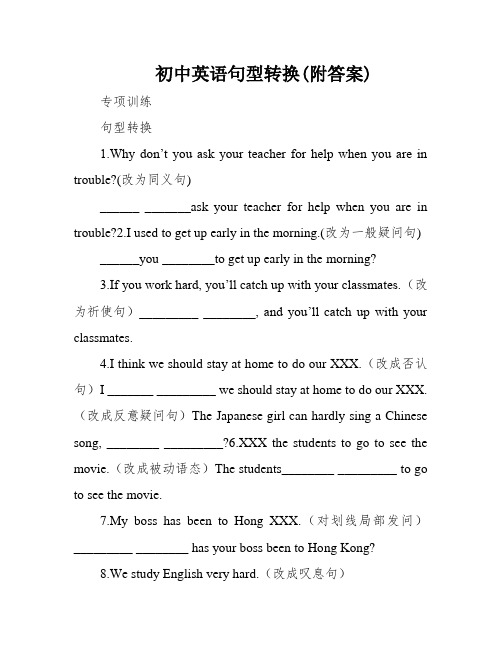
初中英语句型转换(附答案)专项训练句型转换1.Why don’t you ask your teacher for help when you are in trouble?(改为同义句)______ _______ask your teacher for help when you are in trouble?2.I used to get up early in the morning.(改为一般疑问句) ______you ________to get up early in the morning?3.If you work hard, you’ll catch up with your classmates.(改为祈使句)_________ ________, and you’ll catch up with your classmates.4.I think we should stay at home to do our XXX.(改成否认句)I _______ _________ we should stay at home to do our XXX.(改成反意疑问句)The Japanese girl can hardly sing a Chinese song, ________ _________?6.XXX the students to go to see the movie.(改成被动语态)The students________ _________ to go to see the movie.7.My boss has been to Hong XXX.(对划线局部发问)_________ ________ has your boss been to Hong Kong?8.We study English very hard.(改成叹息句)_______ _________we study English!9.Does Jenny like dancing? Can you tell me?(合并成含有宾语从句的复合句)Can you tell me ________Jenny_________ dancing?10.The girl with some flowers in her hand is my sister.(改写成含有定语从句的复合句)The girl ________ ________some flowers in her hand is my sister.11.There are some books on the desk.(改为否定句)There _________ _________ XXX.12.He doesn’t know what he should do.(改成简朴句)He doesn’t know________ _________do.13.I spend an hour in reading English every day.(改为同义句)It _________ me an hour ________read English every day.14.XXX.(改为反意疑问句)Let’s play together, ___________ __________?15.“Where are you going to XXX?”he asked her.(改成复合句)He asked her __________ she _________ going to XXX very hard in our class.(改成叹息句)_________ __________ XXX class!17.He is good at physics, and he can work out the difficult exercise.(改为同义句)He ___________ __________ in physics, and he can work out the difficult exercise.18.There is little milk in the bottle.(改为反意疑问句)There is little milk in the bottle, __________ __________?19.XXX.(改成被动语态)The girls can __________ ___________singing in the next room.20.Lucy will finish writing an e-mail in half an hour.(对划线局部发问)__________ _________ will Lucy finish writing an e-mail?21.XXX.(改成普通疑问句)________ there __________ oranges in the basket?专项锻炼22.The boy is too young to go to school.(同义句)The boy is _________ young _________ he can’t go to school.23.Let’s go to the zoo.(反意疑问句)Let’s go to the zoo, _________ _________?24.I don’t know what I should do.(改为简单句)I don’t know what __________ ___________.25.I think Mr. Zhang is ill in hospital.(否定句)I _________ think Mr. Zhang _________XXX.26.He has never been to Beijing.(反意疑问句)He has never been to Beijing, __________ _________.27.XXX.(感叹句)_________ _________ they are!28.XXX.(改成被动语态)A lot of trees __________ __________ XXX.29.I’ve been learning English since 2003.(对划线局部发问)__________ _________ have you been learning English?30.XXX’t like coffee, either.(归并为一句)__________ I _________ XXX.31.XXX.(改为复数形式)They are ___________ _________.32.XXX XXX.(改为否定句)The twin ___________ need _________bananas.33.XXX when you are in the zoo.(改为祈使句)_________ __________ anything at the animals when you are in the zoo.34.The XXX.(用Yellow River改为选择疑问句)_________is the longest river of China, the Changjiang River_________the Yellow River?35.I don’t think you can finish it on time.(改为反意疑问句)I don’t think he can finish it on time, ____________ ___________?36.The river is 10 meters wide.(对划线部分提问)__________ ___________ is the river.37.Not only Tom but also Bob has been to that island.(改为同义句)_________ Tom and Bob _________ been to that island.38.I XXX to you last month.(改为被动语态)A letter __________ _________ to you last month.39.Your living-room is very bright.(改为感叹句)__________ _________ your living-room is!40.Does the earth go around the sun? My son asked the teacher.(归并为宾语从句)My son asked the teacher _________ the earth __________ around the sun.41.We had a great time yesterday.(改成叹息句)_________ _________ great time we had yesterday!42.The book cost me five yuan.(改成同义句)I _________ five yuan _________ the book.43.The problem is so hard. I can’t work it out.(合并为简单句)。
初中英语句型转换类型总结
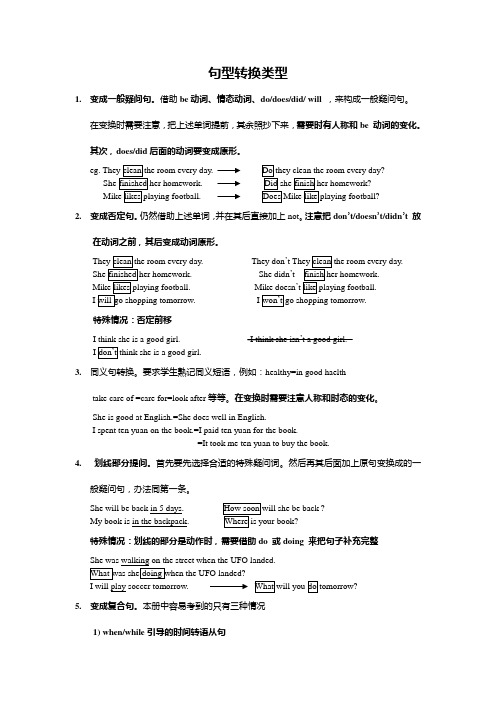
句型转换类型1.变成一般疑问句。
借助be动词、情态动词、do/does/did/ will ,来构成一般疑问句。
在变换时需要注意,把上述单词提前,其余照抄下来,需要时有人称和be 动词的变化。
其次,does/did后面的动词要变成原形。
2.变成否定句。
仍然借助上述单词,并在其后直接加上not。
注意把don’t/doesn’t/didn’t 放在动词之前,其后变成动词原形。
They don’She didn’tMike doesn’特殊情况:否定前移I think she is a good girl. I think she isn’t a good girl.3.同义句转换。
要求学生熟记同义短语,例如:healthy=in good haelthtake care of =care for=look after等等。
在变换时需要注意人称和时态的变化。
She is good at English.=She does well in English.I spent ten yuan on the book.=I paid ten yuan for the book.=It took me ten yuan to buy the book.4.划线部分提问。
首先要先选择合适的特殊疑问词。
然后再其后面加上原句变换成的一般疑问句,办法同第一条。
She will be back in 5 days.My book is in the backpack.特殊情况:划线的部分是动作时,需要借助do 或doing 来把句子补充完整She was walking on the street when the UFO landed.I will play soccer tomorrow.5. 变成复合句。
本册中容易考到的只有三种情况1) when/while引导的时间转语从句She was coolong. Mary came home.2) if 引导的条件状语从句(注意主句、从句使用的时态不同)有or, if 引导的用否定)Work hardIf you work hard, you will pass the exam. (有and, if 引导的用肯定)3)直接引语变成间接引语。
初一英语句型转换

初一英语句型转换的专项练习练习一:肯定句变否定句1.He is a student.He is not a student.2.They like playing football.They don't like playing football.3.She can sing a song.She can't sing a song.练习二:陈述句变一般疑问句1.I am from China.Are you from China?2.He has a new bike.Does he have a new bike?3.They are watching TV.Are they watching TV?练习三:划线部分提问1.The book is on the desk. (划线部分为on the desk)Where is the book?2.He is my brother. (划线部分为my brother)Who is he?3.They are five yuan. (划线部分为five yuan)How much are they?— 1 —练习四:同义句转换1.It's time for lunch.It's time to have lunch.2.He is tall and thin.He is a tall and thin man.3.What's your name?May I know your name?以上是一些初一英语句型转换的专项练习,包括肯定句变否定句、陈述句变一般疑问句、划线部分提问和同义句转换等。
通过这些练习,你可以更好地掌握英语句型的变换规律,提高你的英语水平。
记得多做练习,多思考,相信你会越来越擅长英语句型转换的!— 2 —。
初中英语句型转换(陈述句变一般疑问句特殊疑问句及练习)
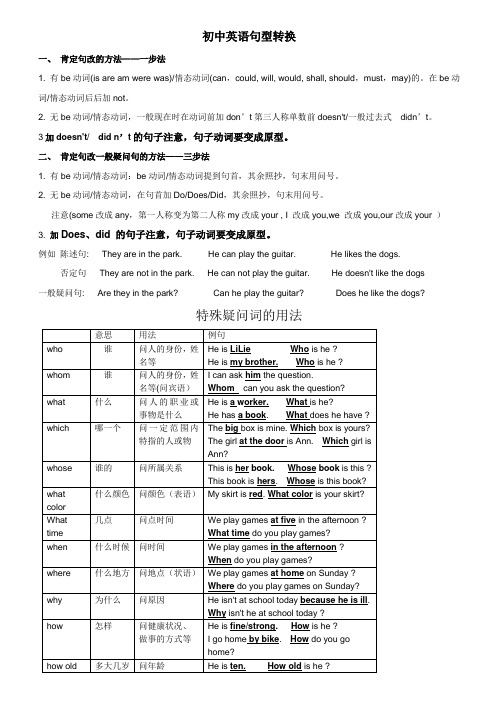
3 加 doesn't/ did n’t 的句子注意,句子动词要变成原型。
二、 肯定句改一般疑问句的方法——三步法
1. 有 be 动词/情态动词:be 动词/情态动词提到句首,其余照抄,句末用问号。
2. 无 be 动词/情态动词,在句首加 Do/Does/Did,其余照抄,句末用问号。
注意(some 改成 any,第一人称变为第二人称 my 改成 your , I 改成 you,we 改成 you,our 改成 your )
My book is over there. Whose book is over there ?
主语的定语 主语 谓语
疑问词 主语 谓语
以上两点方法都是:
用正确的疑问词代替画线部分,再把句号改为问号,其余部分一般不做改变
3.对表语或宾语的定语部分提问,其语序是:
疑问词+表语或宾语(画线部分所修饰的名词)+一般疑问句(省略画线部分和它所修饰的名词)
一般疑问句: Are they in the park?
Can he play the guitar?
Does he like the dogs?
综合练习: 1. The children have a good time in the park. 否定句:___________________________________ 一般疑问句:___________________________________ 2. There are about nine hundred people at the concert.(音乐会) 否定句:_________________________________ 一般疑问句:________________________________________ 对划线部分提问:____________________________________ 3. There is only one problem. 否定句:_____________________________________ 一般疑问句:________________________________________ 肯定/否定回答:____________________________________ 4. Ann does her homework every evening. 否定句:__________________________________________ 一般疑问句:________________________________________ 对划线部分提问:____________________________________ 5. I read an English book every day. 否定句:__________________________________________ 一般疑问句:________________________________________ 肯定/否定回答:____________________________________ 对划线部分提问:____________________________________ 6. My brother is in the park now. 否定句:____________________________________ 一般疑问句:________________________________________ 肯定/否定回答:__________________________ 对划线部分提问:____________________________________ 7. She has some bread for lunch today. 否定句:__________________________________________ 一般疑问句:_________________________________ 肯定/否定回答:____________________________________ 8. They read English every day. 否定句:___________________________________ 一般疑问句:________________________________________ 肯定/否定回答:____________________________________ 对划线部分提问:____________________________________
初中英语句型转换篇
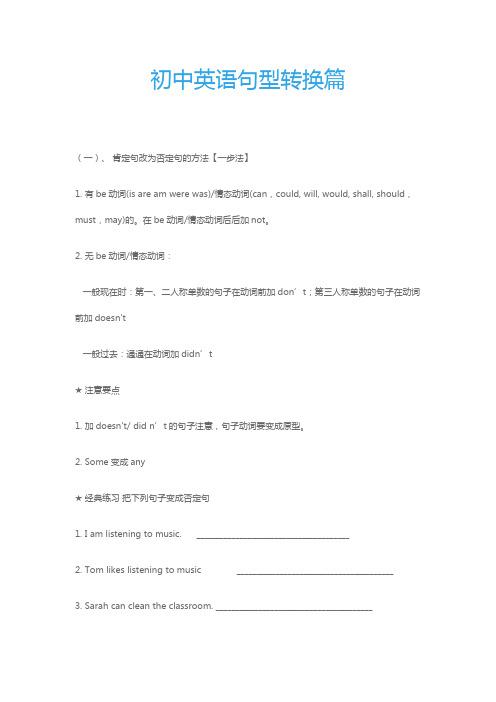
初中英语句型转换篇(一)、肯定句改为否定句的方法【一步法】1. 有be动词(is are am were was)/情态动词(can,could, will, would, shall, should,must,may)的。
在be动词/情态动词后后加not。
2. 无be动词/情态动词:一般现在时:第一、二人称单数的句子在动词前加don’t;第三人称单数的句子在动词前加doesn't一般过去:通通在动词加didn’t★注意要点1. 加doesn't/ did n’t的句子注意,句子动词要变成原型。
2. Some变成any★经典练习把下列句子变成否定句1. I am listening to music. _______________________________________2. Tom likes listening to music ________________________________________3. Sarah can clean the classroom. ________________________________________4. I put a book on my head. ________________________________________5. There were some flowers in the vase. ________________________________________6. We play basketball on Sundays. _______________________________________7. I go to see my parents once a month. _______________________________________8. She needs some masks. _______________________________________9. They like making the puppet. _______________________________________10. Su Hai and Su Yang lived in a new house._______________________________________(二)、肯定句改一般疑问句的方法【三步法】★方法1. 有be动词/情态动词:be动词/情态动词提到句首,其余照抄,(some改成any,第一人称变为第二人称my改成your , I 改成you,we 改成you,our改成your )句末用问号。
初中英语句型转换讲解及练习

句型转换讲解及训练肯定陈述句变否定陈述句步骤:一看情系助二变 第一人称I ,we 变第二人称you my---yoursome-----any something---anything already----yet :并列连词and--or too----either eg: Judy can write stories.________________________________________________ He reads Chinese pomes every morning.________________________________________________ His friend has already mailed the photos._________________________________________________ 陈述句变一般疑问句 ;步骤:一看情系助二变eg :My mother has lunch in the factory._____________________________________________________ {She did very well in her English exam._____________________________________________________ Mary often watches TV at home in the evening._____________________________________________________ There is some milk in the bottle._____________________________________________________*陈述句变选择疑问句的方法:首先将句子变成一般疑问句,然后用or 连接被选择的部分。
初中英语句型转换题
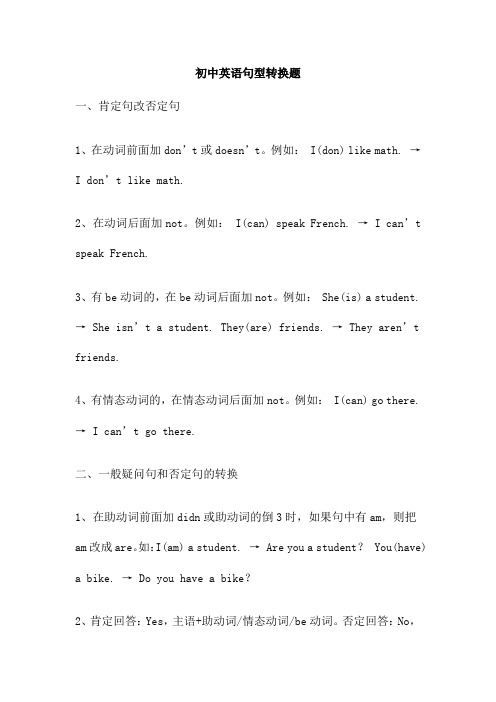
初中英语句型转换题一、肯定句改否定句1、在动词前面加don’t或doesn’t。
例如: I(don) like math. →I don’t like math.2、在动词后面加not。
例如: I(can) speak French. → I can’t speak French.3、有be动词的,在be动词后面加not。
例如: She(is) a student. → She isn’t a student. They(are) friends. → They aren’t friends.4、有情态动词的,在情态动词后面加not。
例如: I(can) go there. → I can’t go there.二、一般疑问句和否定句的转换1、在助动词前面加didn或助动词的倒3时,如果句中有am,则把am改成are。
如:I(am) a student. → Are you a student? You(have)a bike. → Do you have a bike?2、肯定回答:Yes,主语+助动词/情态动词/be动词。
否定回答:No,主语+助动词/情态动词/be动词 not。
如:—Are you a student?—Yes,I am./No,I am not.3、在情态动词或助动词前面加didn或助动词的倒3时,如果句中有was,则把was改成were。
如:He(was) here an hour ago. → Were you here an hour ago?4、就一般疑问句提问。
如:He(is) a doctor. → Is he a doctor?They(have) a car. → Do they have a car? We(will) go to school tomorrow. → Will we go to school tomorrow? They(can) swim. → Can they swim?5、就否定句提问。
初中句型转换专项
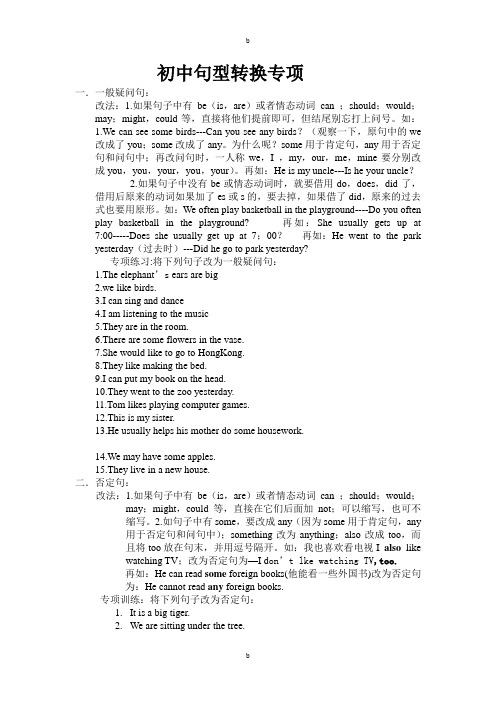
初中句型转换专项一.一般疑问句:改法:1.如果句子中有be(is,are)或者情态动词can ;should;would;may;might,could等,直接将他们提前即可,但结尾别忘打上问号。
如:1.We can see some birds---Can you see any birds?(观察一下,原句中的we改成了you;some改成了any。
为什么呢?some用于肯定句,any用于否定句和问句中;再改问句时,一人称we,I ,my,our,me,mine要分别改成you,you,your,you,your)。
再如:He is my uncle---Is he your uncle?2.如果句子中没有be或情态动词时,就要借用do,does,did了,借用后原来的动词如果加了es或s的,要去掉,如果借了did,原来的过去式也要用原形。
如:We often play basketball in the playground----Do you often play basketball in the playground? 再如:She usually gets up at 7:00-----Does she usually get up at 7;00?再如:He went to the park yesterday(过去时)---Did he go to park yesterday?专项练习:将下列句子改为一般疑问句:1.The elephant’s ears are big2.we like birds.3.I can sing and dance4.I am listening to the music5.They are in the room.6.There are some flowers in the vase.7.She would like to go to HongKong.8.They like making the bed.9.I can put my book on the head.10.They went to the zoo yesterday.11.Tom likes playing computer games.12.This is my sister.13.He usually helps his mother do some housework.14.We may have some apples.15.They live in a new house.二.否定句:改法:1.如果句子中有be(is,are)或者情态动词can ;should;would;may;might,could等,直接在它们后面加not;可以缩写,也可不缩写。
初中英语句型转换
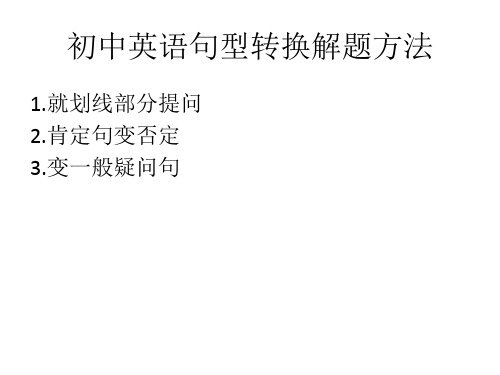
→How many books are there on the desk?
(二)当原句里无上述词语时,应根据时态在主语 之前加do(does)、did等助动词来构成一般疑问句, 谓语动词用原形
三、抄写剩余部分 在前两步做好之后,接着就是 要把原句的剩余部分再抄写一遍,在
抄写过程中也不可忽视以下几个问题:
(一)要删去画线部分(若画线部分是谓语,应用 do的适当形式替代);
8:对“颜色”划线,用what colour, 如果颜 色做定语,what colour 后要跟被修饰名词。
Her sweater is red. --- what color is her sweater? 9:对名词所有格,名词性物主代词划线用
whose, 如果作定语,whose 后后要跟被修 饰的名词。
• (三)对谓语部分提问时,使用“疑问词 (what)+一般疑问句”。其作法是:一般把疑问词 what放在句首,然后将原句改为一般疑问句,在 改为一般疑问句时,根据原句时态将do的适当形 式放在删去的划线位置。如:
• 1. Wei Feng is going to dance in the park this afternoon. →What is Wei Feng going to do in the park this afternoon?
What are the children doing on the hill?
3. She has four lessons in the morning.
初中英语句型转换

句型转换“句型转换”题主要有两大类:一是基本句式的转换;二是同义句的转换。
基本句式的转换一、基本句式的转换主要是指“肯定句、否定句、一般疑问句、特殊疑问句、反意疑问句和选择疑问句、祈使句、感叹句”的转换。
1.肯定句、否定句和一般疑问句的转换(1)含有be动词(am,is,are,was,were)、助动词(do,does,did)和情态动词(can,could,should,will,would,may,might)的句子;肯定句改为否定句:直接在be动词、助动词、情态动词后面加not 肯定句改为一般疑问句时,一律将be动词、助动词和情态动前移到句首(首字母大写)。
肯定回答用“Yes”;否定回答用“No”。
“Yes”或“No”后面的主语必须用代词,“No”后面必须用否定缩略式。
练习:1、改为否定句:There are some pay phones on that street.Tony will travel around the world.He can cook Chinese food.2、改为一般疑问句,并作肯定、否定回答There is a hotel next to my school.Bridge Street is a good place to have fun.We are cleaning the room now.2)只含有行为动词的句子必须借助助动词do;does;did改为否定句时,直接在行为动词后面加don’t(一般现在时态,主语是除第三人称单数之外的人称和数时),doesn’t(一般现在时态,主语是第三人称单数时),didn’t(一般过去时态)改为一般疑问句时,在句首加Do,Does或Did。
肯定回答用“Yes”,后面动词用do;does或did”;否定回答用“No”,后面动词用don't;doesn't;didn't。
练习:1、改为否定句Mary often plays sports after dinner.Alice attends the lecture once a week.Mike drew a picture on the blackboard.2、改为一般疑问句The children like playing games.Mary usually goes to school on foot.Tom went to London yesterday.2.特殊疑问句的转换把句子转换为特殊疑问句,首先要确定划线部分的“疑问词”,人、物、时间、地点、原因、数量等分别用:who;whose;what;when;where;why;how;how many;how much;how often;how old;how long等。
初中英语句型转换

初中英语句型转换肯定句陈述句否定句句型一般疑问句疑问句特殊疑问句一、陈述句1、概述用来叙述一个事实或观点的句子叫陈述句(declarative sentence)。
陈述句有肯定和否定两种形式,一般用降调,句末用句号。
2、语序陈述句的语序一般是“主语+谓语部分”,或“主语+系动词+表语”。
The ruler is blue.这把尺子是蓝色的。
I’m a student.我是一个学生。
I lost my way.我迷路了。
He likes playing cards.他喜欢玩卡片。
You can give it to me.你可以把它拿给我。
3、否定结构用not和助动词或情态动词否定,not一般放在助动词或情态动词之后。
I’m not a thief.我不是小偷。
I can not swim.我不会游泳。
He doesn’t like sports.他不喜欢运动。
4、肯定句和否定句的转换:(句中有some,要改成any.)第一步:看句中有没有be动词(am、is、 are、 was、 were)、和情态动词(can、could、must、will、would、shall、should、may、might等),如果有,则直接在其后面加not,例如:The ruler is blue.这把尺子是蓝色的。
(改为否定句)The ruler is not blue.这把尺子不是蓝色的。
I can swim.我会游泳。
(改为否定句)I can not swim.我不会游泳。
第二步:如果句中没有be动词情态动词,则根据谓语动词的形式借助do的相应形式放在谓语动词前面。
具体方法是:如果谓语动词是原形或者主语是第一人称、第二人称、第三人称复数则借助do;如果谓语动词是一般现在时第三人称单数形式,则借does;需要注意的是,借does后,原句的谓语动词要变回原形;如果谓语是过去式,则借助did,例如:He likes sports.他喜欢运动。
初中英语语法大全:句型转换

Ⅰ.题型介绍所谓“句型转换”就是先给⼀个完整的句⼦A,再根据括号内的要求(有时没有明确,须⾃⼰观察),在第⼆个句⼦B的空⽩处填上适当的词来完成的句型转换。
Ⅱ.题型分类从形式上看,有如下⼏种形式:①某⼀词或词组的转换;②词组与句⼦的转换;③同义句型的转换;④为纠正常犯语⾔错误⽽设计的题⽬。
从内容上看,此题型涉及的⾯较⼴,主要有:①句⼦功能⽅⾯的转换。
包括陈述句(肯定与否定)、四种题疑问句、祈使句、感叹句的转换;②句⼦结构⽅⾯的转换。
即简单句、复合句、并列句之间的转换;③语态的转换。
即主动语态与被动语态之间的转换;④常⽤句型与词汇⼿段的转换。
Ⅲ.具体分类如下⼀、陈述句与疑问句、祈使句、感叹句间的转换1、陈述句中肯定句变为否定句,⼤部分是⽤not来改变谓语结构,但也有借⽤否定意义的词,如nothing, nobody, none, neither, little, few, never, hardly等,例如::A:Tom does well in maths.B:Tom doesn't do in maths.A:He has much to do.B:He has nothing to do.A:All of my classmates like art.B:None of my classmates likes art.2、改为疑问句。
根据上下句的结构和词的减少,来判断变为哪⼀种形式的疑问句。
例如:A:My brother often has breakfast at school.B: Does your brother often have breakfast at school?A:Tom's already weak in English.B:Tom's already weak in English, isn't he ?A:The red light changes every two minutes.B:How often does the red light change?3、改为感叹句。
初中英语句型转换专项练习题及答案

初中英语句型转换专项练习题及答案一、句型转换(主动句变被动句)1. They built a new school in our neighborhood.→ A new school was built in our neighborhood by them.2. My mother will clean the house tomorrow.→ The house will be cleaned by my mother tomorrow.3. They are making a cake in the kitchen.→ A cake is being made in the kitchen by them.4. Someone had already booked a table at the restaurant.→ A table had already been booked at the restaurant.5. The dog chased the cat up the tree.→ The cat was chase d up the tree by the dog.二、句型转换(肯定句变否定句)1. Jane sings very well.→ Jane doesn't sing very well.2. They usually go swimming in the summer.→ They don't usually go swimming in the summer.3. My father can fix the computer.→ My father can't f ix the computer.4. We have finished our homework.→ We haven't finished our homework.5. She enjoys playing the piano.→ She doesn't enjoy playing the piano.三、句型转换(陈述句变疑问句)1. They live in Paris.→ Do they live in Paris?2. You have finished your homework.→ Have you finished your homework?3. Kate was swimming in the pool.→ Was Kate swimming in the pool?4. He can speak three languages.→ Can he speak three languages?5. I will go to the movies tonight.→ Will I go to the movies tonight?四、句型转换(正常语序变倒装语序)1. She is listening to music.→ Is she listening to music?2. They have finished their breakfast.→ Have they finished their breakfast?3. Kate will visit her grandmother tomorrow.→ Will Kate visit her grandmother tomorrow?4. He can speak French.→ Can he speak French?5. The students were playing basketball in the gym.→ Were the students playing basketball in the gym?五、句型转换(选择疑问句变宾语从句)1. Where did you go yesterday?→ Can you tell me where you went yesterday?2. How long have they been friends?→ Do you know how long they have been friends?3. Are you going to the party?→ Could you tell me if you are going to the party?4. Why did she choose that book?→ I wonder why she chose that book.5. Which color do you like best?→ Can you tell me which color you like best?以上是初中英语句型转换专项练习题及答案,希望对您的学习有所帮助。
- 1、下载文档前请自行甄别文档内容的完整性,平台不提供额外的编辑、内容补充、找答案等附加服务。
- 2、"仅部分预览"的文档,不可在线预览部分如存在完整性等问题,可反馈申请退款(可完整预览的文档不适用该条件!)。
- 3、如文档侵犯您的权益,请联系客服反馈,我们会尽快为您处理(人工客服工作时间:9:00-18:30)。
初中英语句型转换一、肯定句改的方法——一步法1. 有be动词(is are am were was)/情态动词(can,could, will, would, shall, should,must,may)的。
在be动词/情态动词后后加not。
2. 无be动词/情态动词,一般现在时在动词前加don’t第三人称单数前doesn't/一般过去式didn’t。
3加doesn't/ did n’t的句子注意,句子动词要变成原型。
二、肯定句改一般疑问句的方法——三步法1. 有be动词/情态动词:be动词/情态动词提到句首,其余照抄,(some改成any,第一人称变为第二人称my 改成your , I 改成you,we 改成you,our改成your )句末用问号。
2. 无be动词/情态动词,在句首加Do/Does/Did,其余照抄,(some改成any,第一人称变为第二人称my改成your , I 改成you,we 改成you,our改成your )句末用问号。
3. 加Does、did 的句子注意,句子动词要变成原型。
例如陈述句: They are in the park. He can play the guitar. He likes the dogs.否定句They are not in the park. He can not play the guitar. He doesn't like the dogs一般疑问句: Are they in the park? Can he play the guitar? Does he like the dogs?把下列句子变成一般疑问句和否定句1. I am listening to music. _______________________________________2 Tom likes listening to music ________________________________________3. Sarah can clean the classroom. ________________________________________4. I put a book on my head. ________________________________________5. There were some flowers in the vase. ________________________________________6. We play basketball on Sundays. _________________________________7 I go to see my parents once a month. _________________________________8. She needs some masks. _________________________________9. They like making the puppet. ______________________10.SuHai and Su Yang lived in a new house. ________________________ ____________________特殊疑问词的用法意思用法例句who 谁问人的身份,姓名等He is LiLie Who is he ? He is my brother.Who is he ?whom 谁问人的身份,姓名等(问宾语)I can ask him the question. Whom can you ask the question?what 什么问人的职业或事物是什么He is a worker.What is he?He has a book. What does he have ?which 哪一个问一定范围内特指的人或物The big box is mine. Which box is yours? The girl at the door is Ann. Which girl is Ann?whose 谁的问所属关系This is her book.Whose book is this ?This book is hers. Whose is this book? whatcolor什么颜色问颜色(表语)My skirt is red. What color is your skirt?What time 几点问点时间We play games at five in the afternoon ?What time do you play games?when 什么时候问时间We play games in the afternoon ?When do you play games?where 什么地方问地点(状语)We play games at home on Sunday ?Where do you play games on Sunday?why 为什么问原因He isn't at school today because he is ill.Why isn't he at school today ?how 怎样问健康状况、做事的方式等He is fine/strong. How is he ?I go home by bike. How do you go home?how old 多大几岁问年龄He is ten.How old is he ?how many 多少跟复数名词,问数量There are thirty boys in my class.How many boys are there in your class?how much 多少跟不可数名词问数量或价钱There is some milk in the bottle.How much milk is there in the bottle?how far 多远问路程It's five kilometers away from here?How far is it from here?how soon 多久问in+一段时间He can finish it in half an hour.How soon can he finish it ?how long 多久问一段时间,问物体的长短He has lived here for a year. How long has he lived here? The desk is one meters long. How long is the desk ?how often 多久(一次)问频率I go to see my parents once a month.How often do you go to see your parents?How的疑问句辨析一、how many和how much的区别how many用来询问可数名词的数量,它的句式是:How many+复数名词+一般疑问句+? how much用来询问不可数名词的数量,也可询问价格。
二、how long,how often,how soon的区别1、how longhow long有以下两个主要意思:1. 表示多长时间,主要用来对一段时间(如three days, four weeks 等)提问。
如:A:How long did he stay here? 他在这儿呆了多久?B:About two weeks. 大约两个星期。
2. 表示某东西有多长。
如:A:How long is the river? 这条河有多长?B:About 500 km. 大约500千米。
2、how often指每隔多久,主要用来对频度副词(如:alway,usually,often,sometimes,never 等)或状语(如:once a week, three times a month 等)提问。
如:A:How often does he come here? 他(每隔)多久来一次?B:Once a month. 每月一次。
3、how soon指再过多久,主要用来对表示将来的一段时间(如:in an hour, in two weeks 等)提问。
如:A:How soon will he be back? 他要多久才回来?B:In an hour. 1 小时以后。
三、how far表示“多远”对距离的提问,如:A:How far is your home from school? 你家离学校有多远?B:My house is three miles from school. 我家里学校有三英里对画线部分提问,除了要注意选择正确的疑问词外,还要注意语序的运用。
1、对句子的主语提问,其语序是:疑问词+谓语+其他成分?(整个句子是陈述句语序)She is their teacher. Who is their teacher?主语谓语主语谓语2、对句子主语的定语部分提问,其语序是:疑问词+主语(即定语所修饰的名词)+ 谓语+其他成分?(整个句子是陈述句语序)My book is over there. Whose book is over there ?主语的定语主语谓语疑问词主语谓语以上两点方法都是:用正确的疑问词代替画线部分,再把句号改为问号,其余部分一般不做改变3.对表语或宾语的定语部分提问,其语序是:疑问词+表语或宾语(画线部分所修饰的名词)+一般疑问句(省略画线部分和它所修饰的名词)I'm looking for my watch.. Whose watch are you looking for ?宾语的定语宾语疑问词宾语一般疑问句(省略掉my watch)4、对表语、宾语或状语提问,其语序是:疑问词+ 一般疑问句(省略掉画线部分)?He lives in Beijing . Where does he live ?状语疑问词一般疑问句(省略掉画线部分in Beijing )5、对谓语和宾语提问,其语序是:疑问词(What)+ 一般疑问句(其中谓语动词要用do 的相对应形式代替, 省略掉宾语)He watches TV in the evening What does he do in the evening?He watched TV yesterday evening. What did he do in the evening?He is watching TV now. What is he doing now?He was watching TV at that time?. What was he doing at that time?He is going to watch TV this evening. What is he going to do?He has seen the film.What has he done ?综合练习:1. The children have a good time in the park.否定句:___________________________________ 一般疑问句:___________________________________2. There are about nine hundred people at the concert.(音乐会)否定句:_________________________________ 一般疑问句:________________________________________ 对划线部分提问:____________________________________3. There is only one problem.否定句:__________________________________________一般疑问句:________________________________________肯定/否定回答:____________________________________4. Ann does her homework every evening.否定句:__________________________________________一般疑问句:________________________________________对划线部分提问:____________________________________5. I read an English book every day.否定句:__________________________________________一般疑问句:________________________________________肯定/否定回答:____________________________________对划线部分提问:____________________________________6. My brother is in the park now.否定句:__________________________________________一般疑问句:________________________________________肯定/否定回答:____________________________________对划线部分提问:____________________________________7. She has some bread for lunch today.否定句:__________________________________________ 一般疑问句:_________________________________ 肯定/否定回答:____________________________________8. They read English every day.否定句:___________________________________ 一般疑问句:________________________________________ 肯定/否定回答:____________________________________对划线部分提问:____________________________________句型转换题一:1. The girl is singing in the classroom.(改为否定句)+ (改为一般疑问句)2. They are looking for bag.(对画线部分提问)3. I am riding my bike now.(同上)4. There are twelve studens over there.(同上)5. I can speak English.(改为一般疑问句)6. I am writing now.(同上)7. I have a desk and a chair.(用He做主语改写句子)8. She is buying some food in the supermarket.(改为否定句)9. I am ill. (对画线部分提问)10. Does she like growing flowers? (给予否定回答)11. I will make model planes with my classmates on Sunday. (对画线部分提问)12. The girl dances beautifully.(改为感叹句)13. The waiter and the waitress play table tennis every day.( 改为否定句)14. The boy is standing on the man's shoulders.(改为一般疑问句)15. It's ten o'clock.(对画线部分提问)句型转换题二:1.He does well in Maths. (改为否定句)2.Mike runs as fast as Ben. (改为一般疑问句)3.I get up at six thirty every day. (变否定)4.Jim is good at English and Maths. (对画线部分提问)5.Ben runs fast. I run faster. (两句合并为一句)6.The policeman catches the thief. (改为一般疑问句,作否定回答)7. He is thirty kilos. (对画线部分提问)8. Turn right at the third crossing. (改为否定句)9. How can I get to the shopping centre? (改为同义句)10 The computer is very nice. (改为感叹句)11.Are they American cars? (改为单数)12.Don’t go along this street. (改为肯定句)15. I get to the shopping centre by bus. (对画线部分提问)16. It always rains in summer there. (改为一般疑问句,作肯定回答)17. It’s cold in winter there. (对画线部分提问)18. I like autumn best. (改为否定句)19. Do you like spring? (加上winter 改为选择疑问句)20. Su Yang is asking Ben some questions. (对画线部分提问)21. Please turn off the light. (改为否定句)22. I know his telephone number. (改为一般疑问句)23. It is a fine day today. (改为感叹句)24. The children have school today. (改为否定句)25. I’d like to join them.(改为一般疑问句)26. They are going to see a film tomorrow. (对画线部分提问)27. I like collecting stamps and singing. (改为否定句)28. He often cleans his bedroom. (改为一般疑问句)29. Liu Tao is watering flowers in the garden. (对画线部分提问)30. David and Mike are going to planting trees this afternoon. (对画线部分提问)31. He does his homework in the classroom. (改为否定句)32. Wang Bing is heavier than Gao Shan. (对画线部分提问)33. Tom jumps as far as Mike. (改为否定句)34. I see a man behind me. (改一般疑问句)35. Helen is good at singing. (改一般疑问句)36. The boy can jump higher than the girl. (改为否定句)37. It is hot in summer in New York. (对画线部分提问)38. Liu Tao needs some pencils. (改为否定句)39. She is an English girl. (变为复数)40. They are our women doctors. (变为单数)41. Mary can fly. (变为一般疑问句,并作否定回答)42. I like playing football. (改成第三人称单数he)43. He has a brother. (改为一般疑问句)44. Nancy draws some pictures every day. (改为否定句)45. Liu Tao usually reads newspaper. (改为否定句)。
